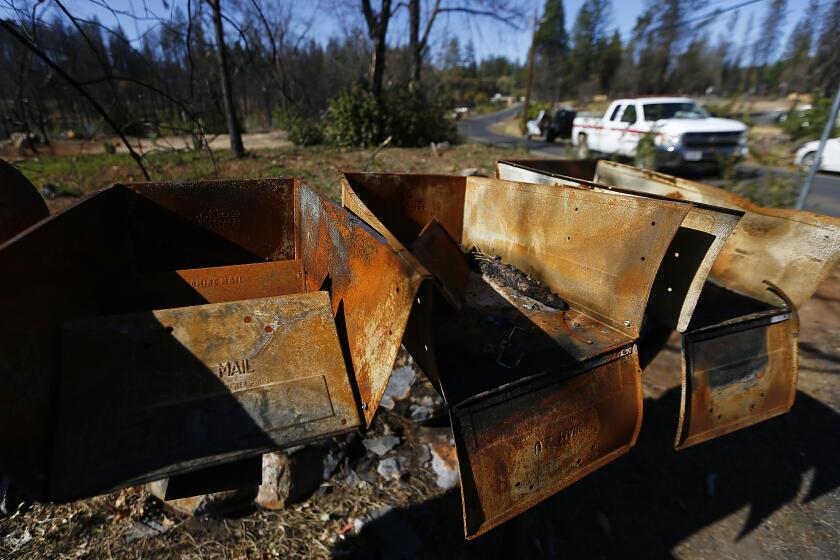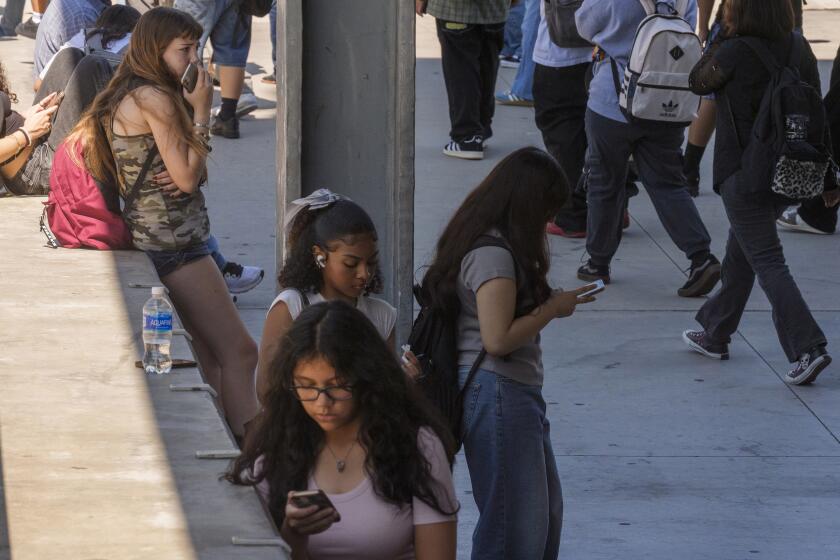Filling up but going nowhere
It’s people like Simi Valley resident Geoff Jameson who keep Fed chief Ben Bernanke up at night.
Jameson, 26, manages a construction crew. I met him the other day at a Westside gas station, where I’d gone to see how $4.50-a-gallon gas is affecting people who have no choice but to keep driving.
“It’s not very easy,” Jameson said as he spent $150 filling his 2007 Ford F-150 pickup truck. “My girlfriend and I used to eat out quite a bit. That’s changing.”
This is what Bernanke was talking about Tuesday when he warned lawmakers in Washington that high fuel prices have “sapped household purchasing power” and are creating “significant downside risks to the outlook for growth.”
Call it the disappearance of discretionary income. As consumers spend more money on gas -- not to mention food, healthcare and other essentials -- they have less to buy other stuff.
And since consumer spending accounts for about two-thirds of all economic activity in this country, when people start pinching pennies, the effects are felt far and wide.
“There can be a real cumulative effect,” said Edward Leamer, director of the UCLA Anderson Forecast. “If people cut back significantly on their spending, service industries will start to lay people off and we could have a real recession.”
At this point, high gas prices are having the most profound effect on working-class people. But wealthier drivers are also feeling the pinch.
Beth Bolivar, a 42-year-old technology consultant, said she’d been planning to take her kids to San Diego for the Fourth of July. Instead, they stayed home.
“The beaches here are just fine,” Bolivar rationalized.
But her skipped trip translates to hotel rooms not stayed in and restaurant meals not eaten, perhaps a trip to Legoland not taken.
That, in turn, translates to suppliers and distributors who may see orders reduced, or payrolls that may not be met and jobs lost. I exaggerate, of course, but not much.
Leamer said it now appears that the housing market will bottom out this year and -- fingers crossed -- a full-blown recession will be avoided. But that’s only if consumer spending remains strong. Retail sales edged up just 0.1% in June, the government reported Tuesday.
“If the pathology that’s affecting the housing sector starts affecting consumer spending, we’re going to have serious trouble,” Leamer warned.
I know what he means. As I’ve written, I’m trying to deal with high gas prices by taking the bus to work once or twice a week. But each time I spend nearly $50 to fill the tank of my 2005 Chrysler PT Cruiser, I’m painfully reminded of the need to cut back further.
I don’t buy new books anymore, opting instead for cut-rate paperbacks at used-book stores. And whereas I once happily snapped up tunes and films I wanted to own, I’ve stopped buying CDs and DVDs.
I still go to the movies (particularly, as the father of a 6-year-old, anything with animated pandas or penguins). But I don’t go nearly as often, and never just to kill a couple of hours. These days, a movie has to be dripping with four-star reviews to earn my $10.
Kayvan Gabbay, a 29-year-old real estate agent, told me he’s being similarly prudent. Gabbay drives a 2001 Chevy Tahoe that’s handy for ferrying clients around but is a big hole in his pocket for everything else.
“I still go to movies,” he said. “But I won’t go to concerts any more. And I definitely won’t go to sporting events.”
Fernando Ramirez, 26, works as a gardener. He schleps his equipment around town in a 1999 Ford Ranger pickup truck.
Ramirez said that when he isn’t working, he pretty much stays home. He’s also trying to cope with high gas prices by asking his clients for a little something extra for mowing their lawns and pruning their rose bushes.
“Some of my clients are agreeing to it,” Ramirez said. “Some of them are saying they will find someone else.”
I watched 64-year-old Danny Sheer slowly back a stretch limo to an open pump. He owns his own limousine company and said it’s getting hard to make ends meet with such big, gas-slurping vehicles.
To survive, Sheer said, he now gets his limos washed only a couple of times a week instead of every day. He’s also taking on more work to help pay fuel costs.
“I used to drive during the day or drive at night,” Sheer said. “Now I drive day and night. On Saturdays, I’m usually working until 4 in the morning. I can’t remember the last time I got eight hours of sleep.”
Margareth Mashouf, 47, told me she thought she was clever when she bought a diesel-powered 2008 Volkswagen Touareg. She expected to get better mileage with diesel.
Mashouf glanced up at the gas station’s prices, which showed a gallon of diesel going for $5.19. A gallon of regular unleaded cost $4.55.
“It’s very hard,” Mashouf said of how high fuel prices have affected her lifestyle. Things are so tough, in fact, she said she’s moving to New Zealand for a new job.
“It’s going to be a nice change,” Mashouf said. “I can’t wait.”
Gas costs more than $8 a gallon in New Zealand. Have a nice trip.
--
Consumer Confidential runs Wednesdays and Sundays. Send your tips or feedback to david.lazarus@latimes.com.
More to Read
Inside the business of entertainment
The Wide Shot brings you news, analysis and insights on everything from streaming wars to production — and what it all means for the future.
You may occasionally receive promotional content from the Los Angeles Times.











